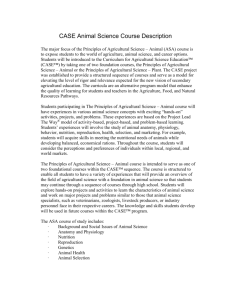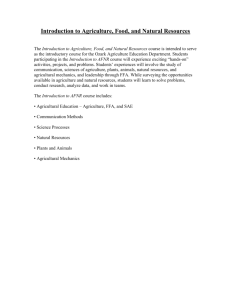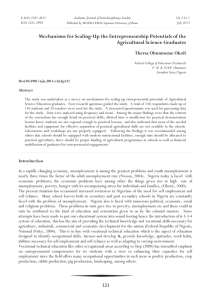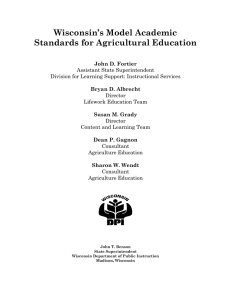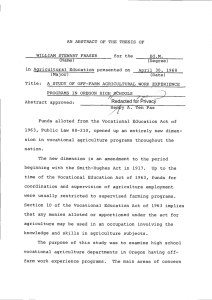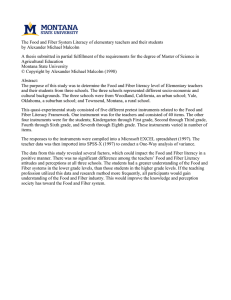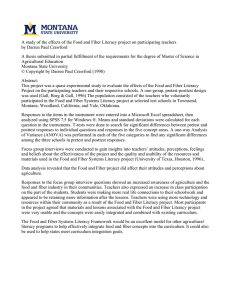The Principles and Philosophy of Agricultural Education
advertisement
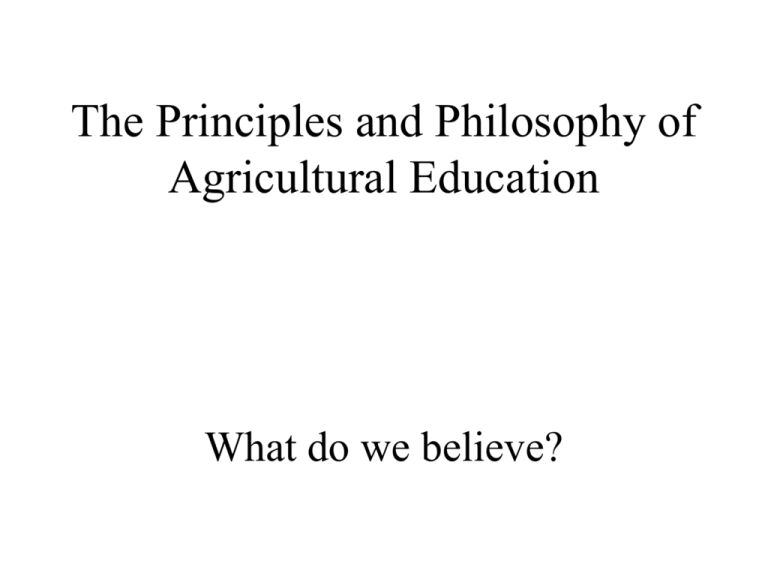
The Principles and Philosophy of Agricultural Education What do we believe? What is Philosophy? and What is a Principle? • Philosophy -• Principle -- What is Vocational Agriculture? • Vocational Education – Other than a BS Degree – Job Specific • Vocational Agriculture and natural resources • Dropping the term Vocational National Study Mission Statement and Goals for Agricultural Education The Mission • The Mission of agricultural education is to provide a total dynamic educational system. • We aspire to excellence as we recruit, prepare and support individuals in agricultural careers. • We serve the people and inform them about agriculture, its needs, opportunities and challenges. We value: • • • • • providing instruction in and about agriculture serving all populations developing the whole person responding to the needs of the marketplace advocating free enterprise and entrepreneurship education functioning as a part of the total educational system • utilizing a proven educational process which includes formal instruction, experiential learning, leadership and personal development. Goals for Agricultural Education • • • • • • • Goal 1 To update instruction in agriculture and expand programs about agriculture. Goal 2 To serve all people and groups equally and without discrimination. Goal 3 To amplify and expand the “whole person” concept of education, including leadership, personal and interpersonal skills. Goal 4 To develop educational programs that continually and systematically respond to the trends and demands of the marketplace. Goal 5 To provide the stimuli that will foster the spirit of free enterprise and develop creative entrepreneurship and innovation. Goal 6 To provide leadership and cultivate strong partnerships in the total educational system. Goal 7 To elevate and extend our standards of excellence in classroom and laboratory instruction, supervised experience and student organizations. A New Era in Agriculture Reinventing Agricultural Education for the Year 2020 • http://www.teamaged.org/2020/page1.htm The Mission of Ag Ed • Agricultural education prepares students for successful careers and a lifetime of informed choices in the global agriculture, food, fiber and natural resources systems 2020 Goals (4) • 1. An abundance of highly motivated, welleducated teachers in all disciplines, prekindergarten through adult, provide agriculture, food, fiber and natural resources systems education • 2. All students have access to seamless, lifelong instruction in agriculture, food, fiber and natural resources systems through a wide variety of delivery systems and educational settings. 2020 Goals (4) • 3. All students are conversationally literate in agriculture, food, fiber and natural resources systems • 4. Partnerships and strategic alliances ensure a continuous presence of education in and about agriculture, food, fiber and natural resources systems. Ag Ed for a lifetime K-6 Education High School Middle School Post Secondary Education Adult years So what does this all mean? • • • • What we teach? Who we teach How we teach? What do you do if you are a H.S. Teacher of Agriculture? Program components • • • • What is a course? What is a class What is a curriculum? What is a program? • Three Program Components (Four really) Four Components of an Agricultural Education Program • • • • Classroom and Laboratory (Shop) Youth Organization Supervised Agricultural Education Program Adult Education Components of a Secondary Ag Program Classroom/Laboratory Classroom and Laboratory Instruction • Without this there is no program • Deals with What to Teach! – Subject matter or content of courses • Deals with how to Teacher! – Methods and techniques to use Youth Organizations • • • • FFA Leadership Citizenship Scholarship SAEP • Experience related to career interest or hobby • Exploratory • Develop sense of work ethic and expectations of the work place Adult Education Optional • • • • Out of school Farm and Non-Farm Courses that are long or short term Young Farmer/Rancher Education Association • Ag teacher is the advisor • Extra pay Trends in Agricultural Education • What does the future hold? – – – – – – New Subject Matter Changing Technology Diverse Students Diverse Expectation of Society Changing School Setting and Structure Modes of delivery of instruction




